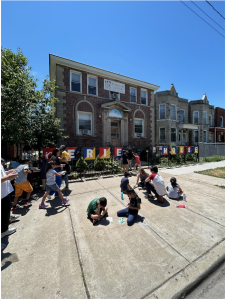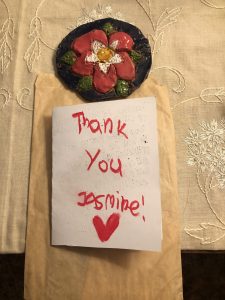 As of late July, I have served as a Communications Intern at Grünewald Guild in Leavenworth, WA for two months as part of my placement as a member of the CAPS Fellows Program. Through working in this position, I have exponentially grown to further refine my vision for my vocation as I approach the final year of my academic career at Valparaiso University. The mission of the guild is highlighted through the three core values of art, faith, and community and, since I am a Music and English major, I initially thought I would gravitate my attention mostly towards the value of art during my time here. Surprisingly, that was not that case and I started to primarily focus upon the aspect of community involvement and how it uniquely manifests itself at this non-profit organization. By nature, I have more of an introverted demeanor and it often takes me a bit of time to feel comfortable with expressing myself in a new environment. Interestingly enough, I did not feel as timid as I typically do during a transitional period of my life, and I think that lack of apprehension I felt is due to the Guild deliberately being a welcoming and community-oriented environment by its very design.
As of late July, I have served as a Communications Intern at Grünewald Guild in Leavenworth, WA for two months as part of my placement as a member of the CAPS Fellows Program. Through working in this position, I have exponentially grown to further refine my vision for my vocation as I approach the final year of my academic career at Valparaiso University. The mission of the guild is highlighted through the three core values of art, faith, and community and, since I am a Music and English major, I initially thought I would gravitate my attention mostly towards the value of art during my time here. Surprisingly, that was not that case and I started to primarily focus upon the aspect of community involvement and how it uniquely manifests itself at this non-profit organization. By nature, I have more of an introverted demeanor and it often takes me a bit of time to feel comfortable with expressing myself in a new environment. Interestingly enough, I did not feel as timid as I typically do during a transitional period of my life, and I think that lack of apprehension I felt is due to the Guild deliberately being a welcoming and community-oriented environment by its very design.
The manner in which I started to recognize myself leaning towards the value of community was quite subtle and implicit but, in hindsight, the pattern is so obvious. For context, the programming I help advertise through the Guild is called the Waymaking Summer 2024 program where, from June to August, there is an eclectic array of art classes held at Grünewald Guild, and approximately two to four of these classes are taught per week. Whether it be a passion they have indulged in for decades or an unfamiliar pursuit, our students can acquire a new toolbox of inventive skills to pave the way for their artistic endeavors through these classes. Though not included in the dictionary, the term “waymaking” remarkably encapsulates this inquiry because it refers to the peculiar and ever-changing approach that artists take towards their creative undertakings. The length of a programming week varies from four to six days, but the day that begins each week remains relatively routine. Programming always starts on a Sunday and, after dinner, the guild hosts an evening vespers service.
The opening vespers service on Sunday evenings has an activity that is distinct from the rest of the services that are held throughout the week. Since the week is young and the guests have only just started to filter into Centrum, the main building on the guild’s campus, the staff is curious to what these students plan to make of their stay. To quench that curiosity, our Executive Director, Sarah Sprouse, leads the group in an activity where every participant is asked to share three words that they would like to be descriptors of their upcoming week. Since I regularly attend these services, I share my three words to each new group that makes their way to the guild, and I have started to notice that I use the word “community” as one of my three words invariably. Though this activity is not new to me, I do not have a predetermined set of words that I recite from memory just for simplicity and consistency. I chose my words purely to reflect my own personal aims for each week, but one of those unchanging aims is to learn about the people who surround me and soak in their stories like a sponge.
Through my daily tasks at Grünewald Guild, I am able to gain this sense of community through doing morning check-ins to supply the studios with ice water and an appropriate amount of art supplies, sitting with the students and guest artists at mealtimes, and engaging in our matins and vespers services. Through these commonplace exchanges, I am able to have meaningful conversations with the students and guest artists, and we are able to learn a lot about each other. There is one simple but incredibly banal question that has been asked many times throughout the vast majority of mealtimes and miscellaneous lulls of leisure and, at first, I thought that this question seemed very superficial and not exceptionally meaningful. Due to the clientele being art lovers, I have learned that this question has a lot more gravity associated with it than I originally expected. The question is, “What is your favorite color?” and an individual’s answer to this question acts as the key to learning a lot about them and their outlook on life.
During the first week of the Waymaking Summer 2024 program, there was an artist talk during one of our morning matins services by Nancy Marsh, a returning guest artist at Grünewald Guild and former art professor at Valparaiso University. She was teaching a weaving class that week and, through this class, her students were able to choose from a wide assortment of colors to create their zesty concoctions. From her artist talk, Nancy elaborated that she does not believe that the choices her students make for the colors of their fabrics made on a whim or by a mere coincidence. She created an intricate chart that acts as a roadmap for the different emotional connotations that are associated with each color of the rainbow, and discussed how she took into account the specific colors that each of her students were drawn to. Through this method of quiet observation, she was able to deeply fathom the complexities of the mindsets of her students.
This artist talk made me think about how, in recent years, active listening has been extensively studied and education about the topic has been embraced by the general public in order to promote empathy and kindness to those in our communities. I think that this truly eye-opening color theory offers a way that people can practice the art of active listening in a helpful and rare configuration. As a writer, I regularly find myself listening to the way in which other people choose to explain certain concepts to learn how to further fortify the strength of my own voice and perspective. I was exceptionally fascinated with Nancy’s casual phrasing of a particular concept within this color theory, and this quotation has branded itself in my brain. To describe how people are so allured to how variations of colors compliment and coexist with one another, she described this occurrence as being “higher than indigo” due to our divine connection that blesses humans to be able to perceive a never-ending multitude of colors. That phrase moved so swiftly and effortlessly off of her tongue and, upon hearing the verbiage used, I wrote it down as fast as I could so that I could remember it.
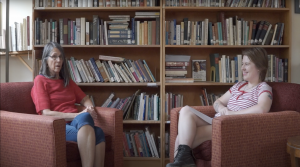
Conversely, my favorite color is not indigo. My favorite color is red. I appreciate the versatility of the color red in its portrayal of emotions. Different shades of this color can overtly represent themes ranging broadly from love to passion to aggression. I have affectionately called the color red the “main character color” due to it boldly being the line leader of the rainbow. There have been multiple instances of students and guest artists at the Guild indirectly acknowledging that red is my favorite color, but there are two occasions that most notably come to mind. During a family-oriented week, there were two children who gave me a thank you card at the end of their time at the guild, and every word and image contained in my specific card was written in red crayon. One of the guest artists, Dede Shilling, and I bonded over the fact that red was both of our favorite colors and we deliberately decided to film our guest artist interview for the Guild’s website while both wearing red. I appreciate that the guild is a mindful community that takes the time to notice and find beauty within the small characteristics of all the members within their community. As cliché as it sounds, I feel as though the “v” in vocation stands for vibrancy and I have definitely found direction in my vocation through the vibrancy of the close-knit community facilitated at Grünewald Guild.
- Jasmine Collins, Communications Intern at Grünewald Guild
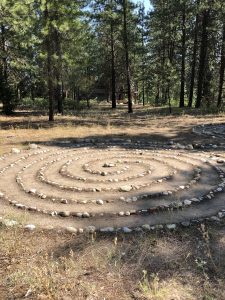 Just like at Valpo, the Grünewald Guild has a walking labyrinth outside, just beyond their central building and right next to the river. Anyone can use it at any point of the day, or night even. I actually heard from someone that they went out to walk it at night and stargaze. We use it during our final Vespers service of each program week too; to meditate on all the things we’ve learned from the week, to center ourselves and find a few minutes of peace and quiet inside our busy bodies.
Just like at Valpo, the Grünewald Guild has a walking labyrinth outside, just beyond their central building and right next to the river. Anyone can use it at any point of the day, or night even. I actually heard from someone that they went out to walk it at night and stargaze. We use it during our final Vespers service of each program week too; to meditate on all the things we’ve learned from the week, to center ourselves and find a few minutes of peace and quiet inside our busy bodies.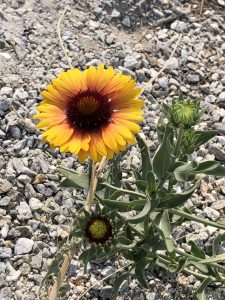 As I’m finishing out my internship here at the Guild with only one week left, I’m looking back on the memories I’ve made with the people and the land around me. Some experiences have opened new doors for me that I’d like to keep open as I come back to Valpo. Others have shown me interesting perspectives and walks of life that add to my understanding of the world and how I engage with it. I think I’ll be visiting our labyrinth at Valpo a lot more often next year.
As I’m finishing out my internship here at the Guild with only one week left, I’m looking back on the memories I’ve made with the people and the land around me. Some experiences have opened new doors for me that I’d like to keep open as I come back to Valpo. Others have shown me interesting perspectives and walks of life that add to my understanding of the world and how I engage with it. I think I’ll be visiting our labyrinth at Valpo a lot more often next year. As of late July, I have served as a Communications Intern at Grünewald Guild in Leavenworth, WA for two months as part of my placement as a member of the CAPS Fellows Program. Through working in this position, I have exponentially grown to further refine my vision for my vocation as I approach the final year of my academic career at Valparaiso University. The mission of the guild is highlighted through the three core values of art, faith, and community and, since I am a Music and English major, I initially thought I would gravitate my attention mostly towards the value of art during my time here. Surprisingly, that was not that case and I started to primarily focus upon the aspect of community involvement and how it uniquely manifests itself at this non-profit organization. By nature, I have more of an introverted demeanor and it often takes me a bit of time to feel comfortable with expressing myself in a new environment. Interestingly enough, I did not feel as timid as I typically do during a transitional period of my life, and I think that lack of apprehension I felt is due to the Guild deliberately being a welcoming and community-oriented environment by its very design.
As of late July, I have served as a Communications Intern at Grünewald Guild in Leavenworth, WA for two months as part of my placement as a member of the CAPS Fellows Program. Through working in this position, I have exponentially grown to further refine my vision for my vocation as I approach the final year of my academic career at Valparaiso University. The mission of the guild is highlighted through the three core values of art, faith, and community and, since I am a Music and English major, I initially thought I would gravitate my attention mostly towards the value of art during my time here. Surprisingly, that was not that case and I started to primarily focus upon the aspect of community involvement and how it uniquely manifests itself at this non-profit organization. By nature, I have more of an introverted demeanor and it often takes me a bit of time to feel comfortable with expressing myself in a new environment. Interestingly enough, I did not feel as timid as I typically do during a transitional period of my life, and I think that lack of apprehension I felt is due to the Guild deliberately being a welcoming and community-oriented environment by its very design. 
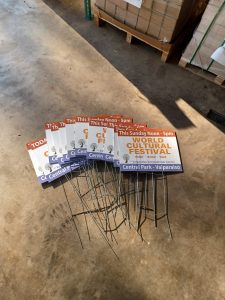 Reconnecting with my high school viola teacher after three years brought up her valid question of, “Any updates with what you want to do with your life?” When I replied, “Well, I want to apply for programs to study or teach in another country for a year… Then possibly grad school for something ‘international’…” we both had to pause and laugh; nothing had changed in the three years since we’d last talked. I still didn’t have a set plan.
Reconnecting with my high school viola teacher after three years brought up her valid question of, “Any updates with what you want to do with your life?” When I replied, “Well, I want to apply for programs to study or teach in another country for a year… Then possibly grad school for something ‘international’…” we both had to pause and laugh; nothing had changed in the three years since we’d last talked. I still didn’t have a set plan.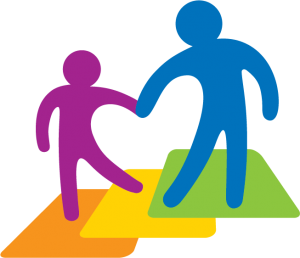 As I near the end of my time at Jacob’s Ladder, I am once again given the chance to reflect on the different experiences and opportunities I have been given this summer. Among all the different opportunities that I have had at my placement, the ones that stick out the most to me are those where I could attend other meetings/events in the community. All of the events that I attended gave me the chance to meet new people, have meaningful discussions with others, and learn new information. These events helped me get out of my comfort zone and learn new information that I will carry with me far beyond my time at Jacob’s Ladder.
As I near the end of my time at Jacob’s Ladder, I am once again given the chance to reflect on the different experiences and opportunities I have been given this summer. Among all the different opportunities that I have had at my placement, the ones that stick out the most to me are those where I could attend other meetings/events in the community. All of the events that I attended gave me the chance to meet new people, have meaningful discussions with others, and learn new information. These events helped me get out of my comfort zone and learn new information that I will carry with me far beyond my time at Jacob’s Ladder. 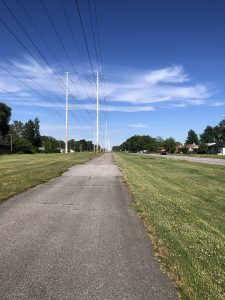 At the beginning of June, I moved to a town I had never visited, to live in a house I had never seen, and to work with people I had only spoken to over Zoom. My family dropped me off, and once I had all of my things arranged, I sat on the bed and had a strange but very familiar feeling wash over me: What do I do now? I had the whole night ahead of me, but everyone I know and everything I do was scattered everywhere but here. The empty span of time ahead of me felt dizzying. So, I just sat there in the what-now feeling, thinking. I began to think about why this feeling was so familiar to me, and I thought of all of the other transitions I have had like this throughout my whole life: from the five times I moved as a kid, to the move into college, to my trip studying abroad, I began to realize that this is all old hat to me. I have done this before, and sure enough, I have done this again.
At the beginning of June, I moved to a town I had never visited, to live in a house I had never seen, and to work with people I had only spoken to over Zoom. My family dropped me off, and once I had all of my things arranged, I sat on the bed and had a strange but very familiar feeling wash over me: What do I do now? I had the whole night ahead of me, but everyone I know and everything I do was scattered everywhere but here. The empty span of time ahead of me felt dizzying. So, I just sat there in the what-now feeling, thinking. I began to think about why this feeling was so familiar to me, and I thought of all of the other transitions I have had like this throughout my whole life: from the five times I moved as a kid, to the move into college, to my trip studying abroad, I began to realize that this is all old hat to me. I have done this before, and sure enough, I have done this again. 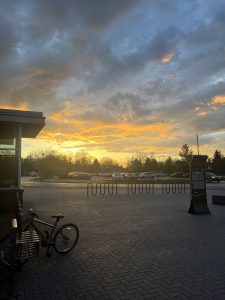 As my internship draws to a close, I’m faced with the same question that I begin the internship with. Why am I working with an environmental non-profit, what difference could I ever make?
As my internship draws to a close, I’m faced with the same question that I begin the internship with. Why am I working with an environmental non-profit, what difference could I ever make?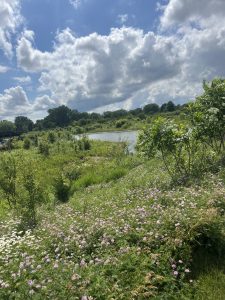
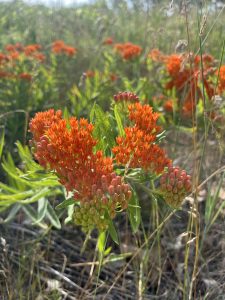 My opinions do matter, and it is possible to voice them loudly. Like a small rock making waves in a pond, a grass growing in the middle of a cracked sidewalk, a bee pollinating the vegetables in a neighborhood garden. My voice is not as small as I have been made to believe.
My opinions do matter, and it is possible to voice them loudly. Like a small rock making waves in a pond, a grass growing in the middle of a cracked sidewalk, a bee pollinating the vegetables in a neighborhood garden. My voice is not as small as I have been made to believe.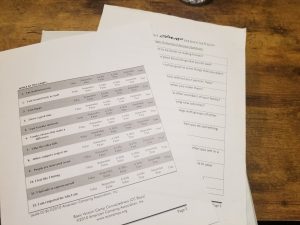 As I sit down to write this blog post, one realization crosses my mind. It is the realization that time keeps marching forward, and that is especially true when it comes to summer and my placement. As of the first week of July, I have officially hit the halfway mark of my duties serving Opportunity Enterprises and Camp Lakeside. The phrases “Time flies when you’re having fun” and “You never truly appreciate what you have until it’s gone” perfectly define and encompass what this experience has been. As I look back at what I have accomplished, a lot of it hasn’t felt as actual work. This is not only true for myself, but also for the campers and staff that I interact with on a daily basis. While much of my job is done behind the scenes, I also have many opportunities throughout the week to interact with campers in a way that I still fulfill my duties as a researcher for the camp and OE as a whole.
As I sit down to write this blog post, one realization crosses my mind. It is the realization that time keeps marching forward, and that is especially true when it comes to summer and my placement. As of the first week of July, I have officially hit the halfway mark of my duties serving Opportunity Enterprises and Camp Lakeside. The phrases “Time flies when you’re having fun” and “You never truly appreciate what you have until it’s gone” perfectly define and encompass what this experience has been. As I look back at what I have accomplished, a lot of it hasn’t felt as actual work. This is not only true for myself, but also for the campers and staff that I interact with on a daily basis. While much of my job is done behind the scenes, I also have many opportunities throughout the week to interact with campers in a way that I still fulfill my duties as a researcher for the camp and OE as a whole. 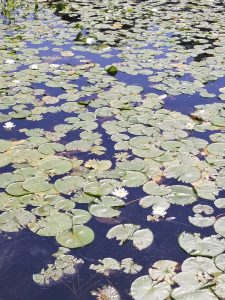
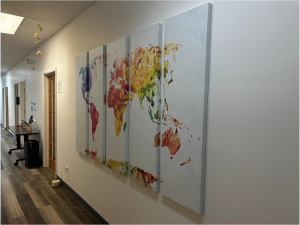 We often hear the phrase “don’t make excuses, make improvements”. For many, this may be a difficult thing to be told – this kind of statement misses and overlooks the individual nuances and circumstances of the situation we find ourselves in. But despite these challenges, we now find ourselves forced to continue on with no acknowledgement of them.
We often hear the phrase “don’t make excuses, make improvements”. For many, this may be a difficult thing to be told – this kind of statement misses and overlooks the individual nuances and circumstances of the situation we find ourselves in. But despite these challenges, we now find ourselves forced to continue on with no acknowledgement of them.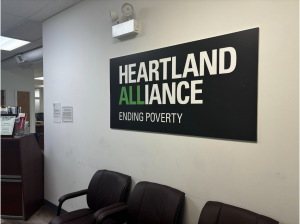 When I take a step back now and consider Heartland’s broader role in its community, it falls in some sense along the lines of this exact idea, providing solutions in all kinds of forms in housing, employment assistance, vocational English language training and even trauma assistance. The team here can only think in these terms (solutions, that is); when people’s livelihoods depend on you, you have no choice.
When I take a step back now and consider Heartland’s broader role in its community, it falls in some sense along the lines of this exact idea, providing solutions in all kinds of forms in housing, employment assistance, vocational English language training and even trauma assistance. The team here can only think in these terms (solutions, that is); when people’s livelihoods depend on you, you have no choice.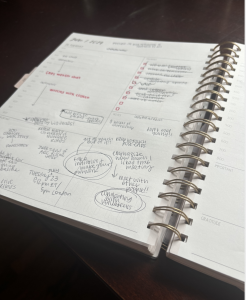 Now that I have over a month of my CAPS fellowship under my belt, it is easy to slip into a routine and let the day-to-day pass by quickly, and without much thought. May and June were a blur of emails back and forth, numerous to-do lists scribbled on Post-it notes, Zoom call meetings, and countless hours of staring at my computer screen. Don’t get me wrong, I am enjoying the work I’m doing and staying busy throughout the long summer days. I enjoy my lists and checking off projects as I complete them. But lately, a little voice in my head has reminded me of the importance of recognizing the small moments of purpose and slowing down before the summer comes to a close.
Now that I have over a month of my CAPS fellowship under my belt, it is easy to slip into a routine and let the day-to-day pass by quickly, and without much thought. May and June were a blur of emails back and forth, numerous to-do lists scribbled on Post-it notes, Zoom call meetings, and countless hours of staring at my computer screen. Don’t get me wrong, I am enjoying the work I’m doing and staying busy throughout the long summer days. I enjoy my lists and checking off projects as I complete them. But lately, a little voice in my head has reminded me of the importance of recognizing the small moments of purpose and slowing down before the summer comes to a close.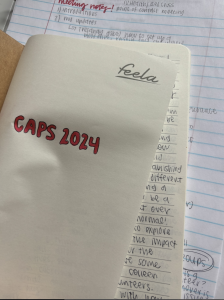
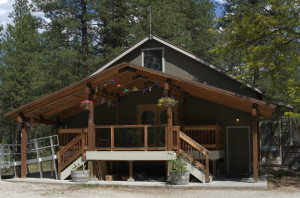 Curiosity killed the cat is a saying that I have heard throughout my child and young adult life. While it may be true in some situations, the age old saying takes away from what I believe to be one of humanities’ main functions, and that is to explore the unexplored.
Curiosity killed the cat is a saying that I have heard throughout my child and young adult life. While it may be true in some situations, the age old saying takes away from what I believe to be one of humanities’ main functions, and that is to explore the unexplored.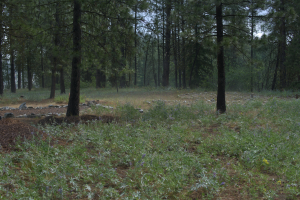
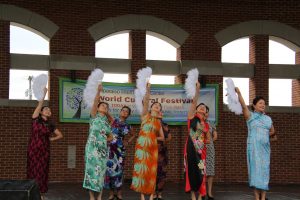
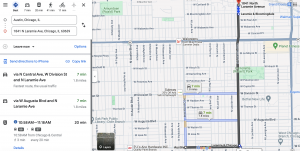 The easiest way to get to 1841 North Laramie Ave from Austin, Chicago by 10 AM every weekday without a car is to take the Green Line at Austin via Ashland/63rd, get off at Laramie & Lake, then take bus 57 towards Grand/Latrobe and get off at Laramie & Bloomingdale. In theory, this journey should only take about 33 minutes: a 5-minute walk to the station, a 12-minute train ride to Laramie & Lake, a 14-minute bus ride to Laramie & Bloomingdale, and a 2-minute walk north towards the building, meaning I could leave my house at 9:20 AM.
The easiest way to get to 1841 North Laramie Ave from Austin, Chicago by 10 AM every weekday without a car is to take the Green Line at Austin via Ashland/63rd, get off at Laramie & Lake, then take bus 57 towards Grand/Latrobe and get off at Laramie & Bloomingdale. In theory, this journey should only take about 33 minutes: a 5-minute walk to the station, a 12-minute train ride to Laramie & Lake, a 14-minute bus ride to Laramie & Bloomingdale, and a 2-minute walk north towards the building, meaning I could leave my house at 9:20 AM.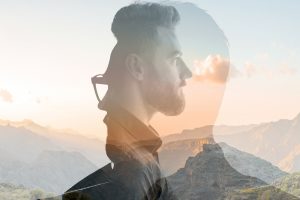 For my second blog in two weeks, I was really struggling to find an experience that I did not touch on the week before this. As I was reflecting on my summer, already at the halfway point of this experience with Jacob’s Ladder and the CAPS Fellowship, I was thinking about what is a lesson I have learned.
For my second blog in two weeks, I was really struggling to find an experience that I did not touch on the week before this. As I was reflecting on my summer, already at the halfway point of this experience with Jacob’s Ladder and the CAPS Fellowship, I was thinking about what is a lesson I have learned.